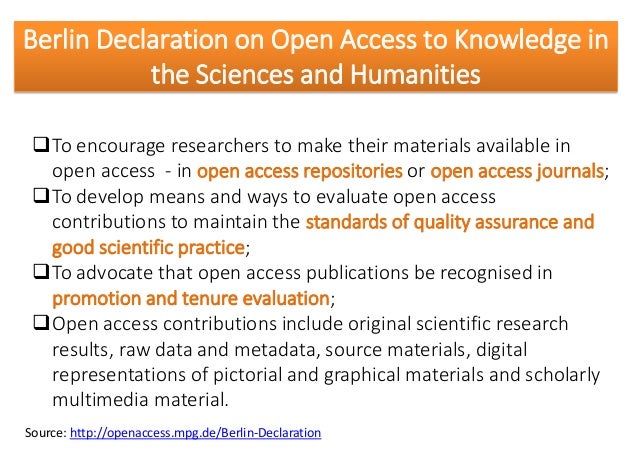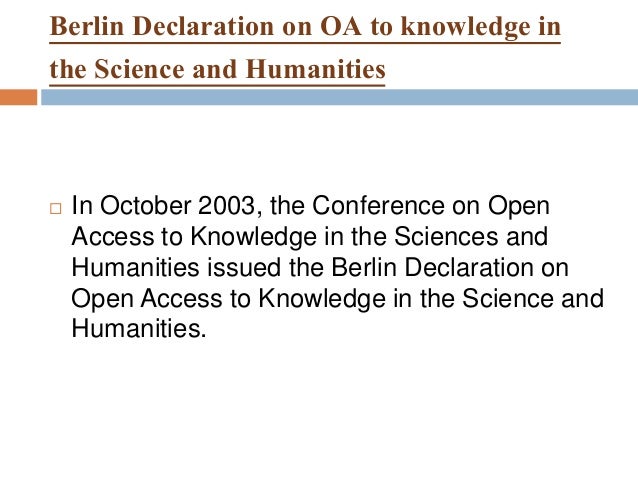Berlin Declaration on Open Access to Knowledge in the Sciences and Humanities
The Berlin Declaration on Open Access to Knowledge (English Berlin Declaration on Open Access to Knowledge in the Sciences and Humanities ) was adopted on 22 October 2003 by the 19 members of initiative of German and international research organizations. By June 2013, it was signed by a total of 435 institutions. It is considered a major milestone in the Open Access movement. The signature took place as a festive culmination of a meeting of the Max Planck Society in Berlin.
From previous Open Access declarations, which are limited to the demand for free access to the scientific journal literature on the Internet, the Berlin Declaration is distinguished by the integration of cultural heritage, so the preserved in archives, libraries and museums treasures. Ingested was this expansion of the European project ECHO, where the Max Planck Institute for the History of Science plays a major role. From the field of museums, the Director General of the State Art Collections in Dresden has signed the Berlin Declaration.
It says in the preface: " In accordance with the Budapest Initiative ( Budapest Open Access Initiative ), the ECHO Charter and the Bethesda Statement (Bethesda Statement on Open Access Publishing), we have designed this Berlin Declaration to the Internet as a tool for to promote a global scientific knowledge base and human reflection and to specify measures that should be considered by policy-makers, research institutions, funding agencies, libraries, archives and museums ".
The first signatories included, among others: the German Rectors' Conference, the Science Council, the German Research Foundation, the Max Planck Society, the Fraunhofer Society, the Science Association Gottfried Wilhelm Leibniz eV, the Helmholtz Association of German Research Centres and the German Library Association. So far, many other international institutions have joined the appeal.
The Open Access Definition ( the English version is authentic ) takes earlier attempts at a definition (in particular, the Bethesda Statement ) literally. It is not only the price barriers, but also to the "permission barriers" caused by restrictive license terms, lifted. For all verantwortbaren purposes intended in any digital medium an Open Access text that is to be deposited in a permanent institutional Eprint archive, may be disseminated and freely edited (The author ( s ) and right holder (s) of investigation Contributions grant ( s) to all users a free, irrevocable, worldwide, right of access to, and a license to copy, use, distribute, transmit and display the work publicly and to make and distribute derivative works, in any digital medium for any responsible purpose, subject to proper attribution of authorship ).
The selected by the Public Library of Science Creative Commons license, which provides for attribution of authorship, and the possibility of adaptations (derivative works) and for commercial purposes may be considered as potential legal specification of the definition of the Berlin Declaration, although both in terms of possibility of machining operations without the consent of the author as well as to the industrial use of reservations in the Open Access movement exist.
The German language translation of the Berlin Declaration was revised in 2006 after it was pointed out that the law contained in the Original for change of works was not disclosed.
In March 2009, the Alliance of German Science Organisations published a Joint Statement of the scientific organizations to open access and copyright.










